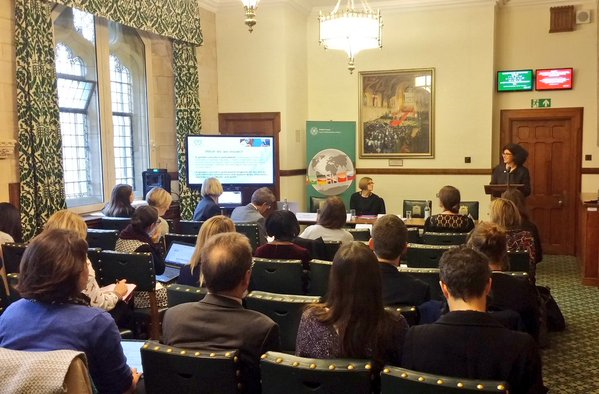

Conference on a gender sensitive Parliament for the UK
BGIPU, in collaboration with Professor Sarah Childs (on secondment to the UK House of Commons and Professor of Politics and Gender at the University of Bristol), convened a one-day conference on 19 November at the UK Parliament to explore key perspectives on making the UK House of Commons a more gender sensitive Parliament.
The conference was opened by the Speaker of the House of Commons, Rt Hon John Bercow MP, who underscored his commitment to facilitate the progression to a more gender sensitive parliament, including through initiating Professor Childs’ short-term secondment to the UK House of Commons to give the issue detailed consideration. As a contribution to Professor Childs’ work, the conference brought together international parliamentarians, academics and UK members and parliamentary staff to hear comparative experiences and debate how a more gender sensitive House of Commons might be best achieved.
A key opening session was delivered by the Director of Programmes of the Inter-Parliamentary Union (IPU) in Geneva, Ms Kareen Jabre, who explained the key elements and objectives of the IPU’s work on how parliaments respond to the expectations and interests of men and women members in their structures and how this can be influenced by the mechanisms, proceedings and functioning of parliaments. This was also illustrated with reference to the key findings of the IPU’s 2011 study on Gender Sensitive Parliaments: A review of Good Practice and the subsequent Plan of Action for Gender Sensitive Parliaments adopted by IPU members in 2012.
Taking forward the discussions, UK parliamentarains and staff were given the opportunity to compare and contrast their own experiences with those of other Parliaments, drawing on case studies from Sweden and Finland as outlined by Dr Lenita Freidenvall of Stockholm University and Dr Johanna Kantola of the University of Helsinki respectively. These presentations were also complemented by the personal perspectives of current Swedish MP, Mr Ola Johansson, and former Finnish MP, Ms Nanna Sumuvuori of the Finnish Institute. There was significant input to discussions by a range of UK MPs, including two of the current Deputy Speakers Ms Natascha Engel and Ms Eleanor Laing. Key aspects discussed drew on practical examples of gender sensitive reform in counterpart Parliaments, including discussions on the nature of the original insensitivity; the actual reform, goal and effect; any resistance and follow-up aspects like institutionalization and permanency.
The discussion also reflected on key concepts of equality and participation, including how infrastructure and processes might affect gender sensitivity and how the prevailing parliamentary culture might also play a key inhibiting or enabling role. This lead to a session moderated by Dr Elizabeth Evans of the Univeristy of Bristol on the possibilities for re-gendering parliaments and the best strategies for reform, also advanced through a detailed presentation by former MP and UK Minister for Women and Equalities, Ms Jo Swinson. The conference wrapped up with a look at possible ways forward with reflections from Ms Jabre of the IPU and Ms Wake from Amnesty International and closing perspectives from the Clerk of the House, Mr David Natzler.
Professor Childs will be using the main elements of these discussions in her ongoing work prior to reporting to UK parliamentary authorities in early 2016 on key issues and strategies aimed at making the UK House of Commons a more gender sensitive parliament. For the BGIPU, this also represents an important objective for our work in advancing core IPU mandates in the UK Parliament under the direction of our International Programme Manager responsible for political empowerment issues, Ms Emily Davies.













